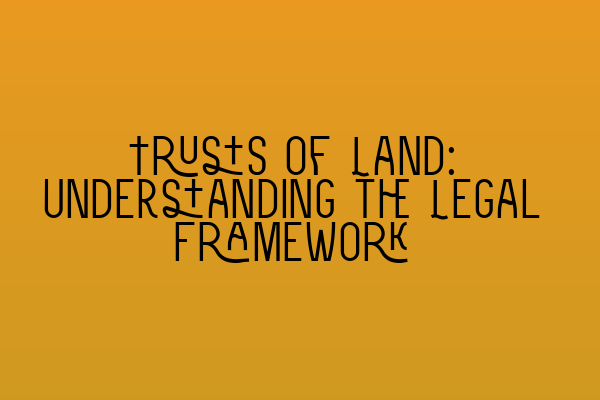**Trusts of Land: Understanding the Legal Framework**
Welcome to SQE Property Law & Land Law! As solicitors specializing in property law, we understand the intricate legal framework surrounding trusts of land. In this blog post, we will provide you with a comprehensive explanation of trusts of land, their legal implications, and their importance in property transactions. So, grab a cup of tea and let’s dive right in!
**What is a Trust of Land?**
A trust of land, also known as a TOLATA (Trusts of Land and Appointment of Trustees Act 1996) trust, is a legal arrangement where property ownership is divided between a legal owner and one or more beneficiaries. The legal owner, or trustee, holds the property on behalf of the beneficiaries in accordance with the terms of the trust.
**Types of Trusts of Land**
There are two main types of trusts of land: express trusts and implied trusts. Let’s explore each of these in more detail:
**1. Express Trusts**
Express trusts are created expressly by the parties involved. In property law, express trusts of land are commonly created through deed or declaration. A deed of trust sets out the terms and conditions of the trust, including the rights and responsibilities of the trustee and beneficiaries. It ensures that the property is held for the intended purposes and that everyone’s interests are protected.
**2. Implied Trusts**
Implied trusts, on the other hand, arise by operation of law or through the intentions of the parties involved. They are not explicitly stated but are implied from the circumstances surrounding the property transaction. Implied trusts can be further categorized into resulting trusts and constructive trusts.
**a) Resulting Trusts**
Resulting trusts come into play when property is purchased in the name of one person, but the purchase money or contributions are made by another person. In such cases, the legal owner holds the property on resulting trust for the person who provided the funds. Resulting trusts can be automatic or presumed, depending on the circumstances.
**b) Constructive Trusts**
Constructive trusts, on the other hand, arise when the legal owner holds the property in circumstances that make it unfair or unconscionable for them to deny the beneficial interest of another person. Constructive trusts are often found in cases of cohabitation, where one party contributes to the purchase or improvement of the property but is not named as a legal owner.
**Legal Implications of Trusts of Land**
Trusts of land have significant legal implications for the parties involved, as well as for property transactions. Here are some key points to keep in mind:
1. **Rights and Obligations**: Trusts of land give beneficiaries the right to occupy, use, and enjoy the property, even though they may not be legal owners. Trustees have a duty to manage the property in the best interests of the beneficiaries.
2. **Dispute Resolution**: Disputes relating to trusts of land often arise when there are disagreements between beneficiaries or between beneficiaries and trustees. In such cases, the court can intervene to resolve the dispute and determine the rights and interests of each party.
3. **Third-Party Interests**: Trusts of land can also affect third parties, such as lenders or buyers. When dealing with property subject to a trust of land, it is essential to consider the rights and interests of all parties involved.
**Importance of Understanding Trusts of Land**
Understanding trusts of land is crucial for anyone involved in property transactions, including buyers, sellers, lenders, and solicitors. Here’s why it matters:
1. **Risk Management**: By understanding trusts of land, buyers and lenders can assess any potential risks associated with the property and make informed decisions.
2. **Contractual Agreements**: Solicitors play a vital role in drafting and reviewing contracts related to trusts of land. Their understanding of the legal framework ensures that the contractual agreements adequately protect their clients’ interests.
3. **Conflict Resolution**: Having a solid understanding of trusts of land enables solicitors to resolve disputes effectively, whether through negotiation, mediation, or court proceedings.
At SQE Property Law & Land Law, we specialize in trusts of land and can provide expert legal advice and assistance for your property transactions. Contact us today to schedule a consultation and ensure that your interests are protected.
We hope this blog post has shed some light on the legal framework surrounding trusts of land. To further enhance your understanding, we recommend checking out our related articles below:
– [SQE 1 Practice Exam Questions](https://fqps.co.uk/sqe/sqe1-preparation/mcq-practice-quiz)
– [SQE 1 Practice Mocks FLK1 FLK2](https://fqps.co.uk/sqe/sqe1-preparation/practice-mocks-quiz)
– [SQE 2 Preparation Courses](https://fqps.co.uk/sqe/sqe2-preparation)
– [SQE 1 Preparation Courses](https://fqps.co.uk/sqe/sqe1-preparation)
– [SRA SQE Exam Dates](https://fqps.co.uk/sqe/sqe1-sqe2-exam-dates)
Thank you for reading, and we look forward to assisting you with all your property law needs!
